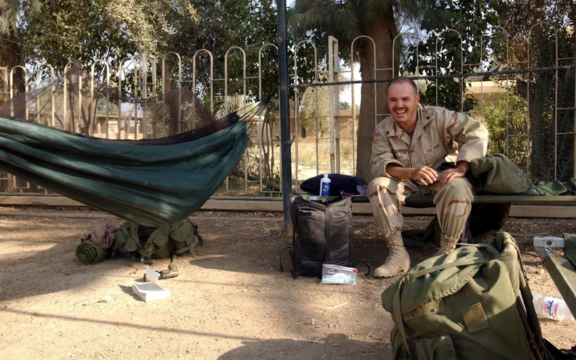Shop
From Crisis to Creativity: Robert’s Story

Last year, we were introduced to the Heroic Hearts Project, a nonprofit dedicated to supporting veterans on their healing journeys after service. This cause deeply resonates with us, as we strongly believe in the right to access medicines and opportunities that promote mental health and healing. Life is short, and it’s essential to not only make the most of it but also to ensure we and those around us feel our best during it.
Through a very successful 2023 giveback campaign, we've had the opportunity to contribute to this mission via SLNT's platforms. This initiative not only made our team feel great but also allowed SLNT to further support modern warfighters, both during and beyond their service. Building on our past success, this marks our second collaboration with the Heroic Hearts Project, and we are excited to continue our support for this valuable mission.
We also wanted to share the inspiring story of Robert, whose life was profoundly impacted by the Project's dedicated healing programs. Individuals like Robert have discovered renewed hope and a brighter future through their courageous efforts.
Together, we can honor and support those who have served our country, and we look forward to continuing our giveback efforts.
Veterans Voice: Robert

By: Hannah Kimyon
Robert's transformation from living the nightmare of PTSD to living a life filled with purpose and creativity serves as a beacon of hope, not just for veterans, but for anyone seeking healing from deep psychological wounds. His journey, drastically altered by an ayahuasca retreat with the Heroic Hearts Project in 2019, underscores the healing potential of psychedelics—a potential increasingly recognized in the fight against PTSD among veterans.
PTSD, or Post-Traumatic Stress Disorder, is a condition that can occur after a person has lived in a state of chronic stress or has experienced or witnessed traumatic events. In veterans like Robert, the rigors of military service and the horrors of war can leave indelible marks on the psyche, manifesting in symptoms such as flashbacks, nightmares, severe anxiety, and uncontrollable flashbacks that feel like re-experiencing the original traumatic events. Robert's own recounting of his descent into PTSD highlights the pervasive nature of the disorder: "Every time a car backfired or someone dropped a book, I was diving for cover," he shared, encapsulating the relentless hyper-vigilance and alienation that characterizes the condition.
The journey to healing for those with PTSD is often complex and multifaceted. Traditional treatments typically involve a combination of talk therapy and medication to manage symptoms. However, these conventional methods do not always provide the sustainable relief needed, as was the case for Robert. Despite initially finding some stability through VA support, life stressors and a cancer diagnosis related to his service in Iraq saw him spiraling back into the depths of his PTSD, underscoring the need for alternative therapies that address the root causes of the disorder.
Enter the ayahuasca retreat program—a turning point in Robert's healing process. Ayahuasca, a psychedelic brew used traditionally by indigenous tribes of the Amazon, has been studied for its potential in treating various mental health disorders, including PTSD. The retreat offered Robert not just a temporary respite from his symptoms but a profound experience that reshaped his approach to life. "It was like my empathy switch turned on, and something was telling me, it's okay to let go," Robert recalls, describing the pivotal moment of ego death and the subsequent emotional release and clarity he experienced.The experience helped Robert to purge years of pain, grief and guilt from his time in the service. It offered an invitation to begin a new chapter free of the patterns of protection he had built up within him that had become destructive rather than helpful.
Perhaps the most transformative aspect of Robert's journey was the realization that healing from PTSD is not only about confronting past traumas but also about forging a new path forward. "After the retreat, I started seeing all of the potential pathways I could take. The kinds of lives I really could choose to have. I didn’t feel stuck anymore," he remarked. The experience gave him permission to play, to try on new hats, and to explore what he wanted to offer the world. He’s since dabbled in many forms of art, from wood and metal working to graphic design to now pursuing an education in filmmaking. His military service is now only a part of his story. It’s not the entirety of who he is.
This narrative is particularly significant in the context of veteran mental health, where traditional therapies often fall short of addressing the deep-seated emotional and psychological scars left by combat. The positive outcome of Robert's experience with ayahuasca highlights the potential of psychedelics as a complementary treatment for PTSD, offering hope for a more holistic and effective approach to healing.
As Robert's story unfolds—from a life once defined by PTSD to one of exploration, creativity, and renewed purpose—it not only illuminates the personal victories achievable through psychedelic therapy but also calls attention to the broader implications for veteran mental health care. In recognizing the profound and lasting impact of his ayahuasca experience, Robert's journey serves as a compelling testament to the healing potential of psychedelics, offering a ray of hope for veterans and others battling the invisible wounds of trauma.
Learn more about Heroic Heart Project or make a donation today.
Recent Articles
Newsletter
Join Our Community: Privacy, Security, Health Updates
